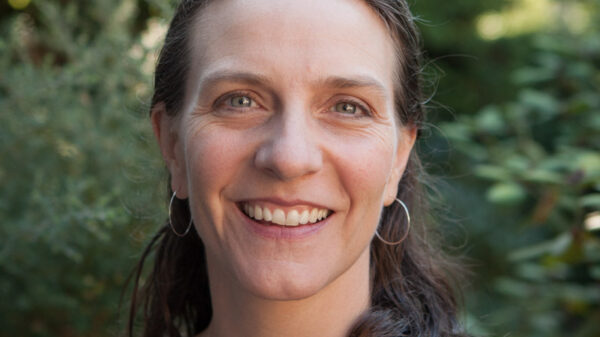Meet Helen Weems: Nurse Practitioner, Plaintiff, and Reproductive Rights Advocate
As a college student, Helen Weems spent a semester in Costa Rica and lived with a host family in a small village.
Though she was working towards an environmental studies degree, something she witnessed in Central America altered the course of her life. Her host mother became pregnant with her third child.
Helen said the woman’s family was incredibly poor, the children were malnourished and the mother was obviously depressed about the idea of trying to support another child. But she had no access to birth control and no options to control when and if she became pregnant.
“I realized that the clearest path to social justice and environmental health is through helping families plan their pregnancies,” Helen said.
After graduating college, Helen’s first job was working as a medical assistant at an abortion clinic in Seattle.
“We did such important work,” she said, tears gathering in her eyes. “I just loved it. It was so intimate and so important. Helping people choose if and when to parent is one of the most powerful tools we have in healthcare.”
Helen went on to become a certified nurse practitioner and worked at a primary care center in Seattle for nearly 15 years. She helped establish a program that creates access to contraception, including IUDs and birth control implants, in high schools around the city.
Throughout her career, she devoted herself to pregnancy prevention and maintained her passion for abortion access.
When her family decided to move to Whitefish, Montana, Helen started researching job options. She had read that physician’s assistants were allowed to provide abortion services in Montana, and assumed that her similar training and experience would qualify her. Helen thought she would finally be able to do what she considered to be the most important work—providing a crucial family planning option to an underserved, rural population.
Shortly after, though, she realized that advanced practice registered nurse (APRNs) like herself were blocked from providing abortion care in Montana. Although leading medical and public health authorities such as the World Health Organization and the American College of Obstetricians and Gynecologists agree that APRNs can provide abortions as safely as physicians, under Montana law, only physicians and physician assistants can legally provide abortion care.
It was an unpleasant surprise, but it didn’t stop Helen from pushing forward.
“I think back to my shock when I found out that nurse practitioners were excluded from being able to provide abortions,” Helen said. “It just felt unfounded. Irrational. We are positioned to fill a healthcare gap that is so real and so vital. We’re here. We’re poised. We’re able. So, why not take that extra step to allow APRNs to provide safe and effective abortion care?”
Though she’s not yet allowed to perform abortions in Montana, Helen has already helped expand critical access to abortion and reproductive health for Montanans.
Before moving to the state a year and a half ago, Helen contacted Susan Cahill, a longtime abortion provider in Kalispell, and asked her to come out of retirement and mentor her. Four years ago, Susan’s clinic had been violently vandalized, forcing her to close up shop. Hers was the only clinic in northwestern Montana that provided first-trimester abortions.
Since Susan’s All Families Healthcare closed, people living in eastern Washington, northern Idaho or northwestern Montana have been forced to travel to either Spokane or Missoula to obtain an abortion. The necessary travel expenses create barriers for so many patients, Helen said, especially in a state as large and rural as Montana.
“You can’t pay for gas, you can’t pay for childcare, you can’t pay for a night or two in a hotel,” she said. “The barriers are all just so much greater when you’re of lower financial means.”
In February, though, Helen and Susan reopened All Families Healthcare in Whitefish. The new clinic has been providing a wide spectrum of healthcare, including abortions, to a growing client base.
“We are here and we’re not going away,” Helen said. “The need for abortion will never go away.”
Hundreds of people have volunteered to help out at the new clinic, from providing transportation for patients, to doing landscaping work around the building. Helen said the office looked like a florist’s shop during the first week because so many supporters sent flowers.
The return of All Families Healthcare is a triumph for reproductive rights in Montana. But there’s still a long way to go. When Susan decides to retire once again, Helen hopes to take over the reins at their clinic and provide abortion care for future patients. And already, on days when Susan is not at the office, patients are unable to obtain abortion care.
That’s why Helen has decided to become a plaintiff in the Center for Reproductive Rights and ACLU of Montana’s challenge to an outdated and unconstitutional Montana law restricting qualified clinicians from providing abortion care services and expanding access. In a state so large and sparsely populated, it’s already too difficult for women to access the family planning options and other care they need. Rural areas are increasingly drained of primary care providers, and nurse practitioners are ready and able to fill that growing healthcare gap.
“We have a shortage and we have a need,” Helen said. “But we also have the people. Let’s do the work.”
Related Content

Center for Reproductive Rights, ACLU of Montana File Lawsuit Challenging Law that Prohibits Qualified Clinicians from Providing Abortions

